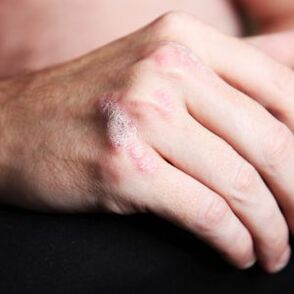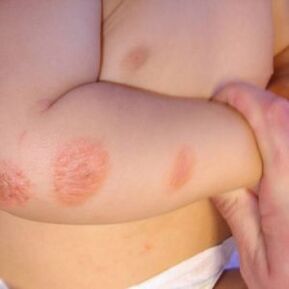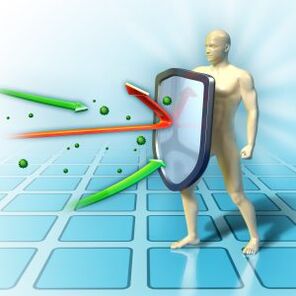
It would be easier for scientists to find an effective treatment if they could clearly understand the causes of psoriasis. The question "why? " Appears not only in the luminaries of science, but also in every patient who has to fight this disease. Theories of incentives began to emerge hundreds of years ago. Today we have dozens of estimates, but all of them are still waiting for scientific evidence. Even studying the possible causes of psoriasis will help many patients to avoid recurrence of the disease, and healthy people will never face it.
Hereditary theory
The world's dermatology has been able to establish one of the causes of psoriasis - a genetic predisposition. Today, 60% of all psoriasis patients have a relative with the same problem. Such results led scientists to study the theory of the hereditary origin of paid lichens in more detail.
On April 5, 2013, the WHO Secretariat prepared a research report in this area. I was able to build the following:
- If one of the parents in the family is ill, the child's risk of illness is 14%;
- If both parents are affected in the family, the risk increases to 41%;
- If a sister or brother is sick - 6%.
In this case, psoriasis can appear several generations later, "bypassing" previous generations.
An important task for biochemists was to find out which gene was responsible for such an inheritance. A study in the patient's genome has identified nine gene loci that may be associated with psoriasis. However, a complete gene responsible for inheriting the disease has not been established.
It is known that paid lichen is not only prone to it, but also to it. This means that a person whose relatives are facing a similar problem will not necessarily suffer from psoriasis. For this reason, it cannot be considered a hereditary disease alone. Additional pathogens will be needed for psoriasis to manifest itself, and the reasons for this can be considered.
In addition, the question remains for the remaining 40% of patients - why did they become ill if no one in their family faced a similar problem? This task forces scientists to look further for the causes of paid lichen.
Infections and viruses such as pathogens

The infectious theory of the disease was one of the first to be studied, about two centuries ago. Nineteenth-century scientists were convinced of the guilt of pathological microorganisms and diligently tried to determine which one was responsible for this disease. This explanation was most obvious, because in patients with psoriasis may appear suddenly and suddenly go into remission. And today there are supporters of this idea among scientists.
Proponents of the theory of infection believe that pathogens affect the vegetative distribution and the endocrine system, affecting their functions. Such changes impair the body's ability to respond to the environment. As a result, if we add another stimulus, skin cells die in 4-5 days, not 30 days (natural for them), so a group of keratinized cells is formed on the hands, head, face or the rest of the body. inflammation.For many years, doctors have been studying fungi and bacteria to find the link between the root cause of the disease. However, among the pathological organisms known in medicine, there is no one who can "trigger" this dermatosis. Today, the infectious theory of the appearance of paid lichens is not considered basic, but is not completely rejected. There is still a link between psoriasis attacks and infections.
Angina, ARVI, streptococcus, tonsillitis, and other infections have been found to be often accompanied by the first occurrence of scaly lichen and cause relapse in remission. However, most doctors believe that infections only trigger the onset of an already existing disease.
The theory of the viral nature of the disease was one of the emerging. However, this hypothesis has completely collapsed since the drug was discovered that psoriasis does not pass from person to person. However, there are viruses in the body that can cause psoriasis if it persists for years, reduces immunity, and damages the skin's immune system. In practice, although a healthy body is not infected with lichen scales, there are cases of blood transfusion from a sick person to a healthy person.
Harmful Metabolism Theory
One of the features that doctors noticed during psoriasis was the low temperature in patients. At first, this was considered one of the symptoms of the disease, but over time, doctors have added a different meaning to this phenomenon. The truth is that a steady drop in temperature indicates a disturbed metabolism. Patients' blood tests confirmed that psoriasis patients had high cholesterol levels in both adults and children.
Patients' blood tests confirmed that psoriasis patients had high cholesterol levels in both adults and children.
Such indicators indicate a violation of lipid metabolism in the body. This, in turn, leads to rapid keratinization of skin cells, which is why some scientists consider psoriasis to be cholesterol diathesis. However, it has not yet been possible to determine whether cholesterol rose before or after the first epidemic.
In addition to cholesterol in the patient's body, the balance of minerals and vitamins is disturbed, and such changes lead to serious consequences. It was found that patients with paid lichen had an excess of vitamin C and insufficient vitamins B6, B12, A. Also note that they violate the content:
- sink;
- iron;
- mis;
- cobalt.
Changes in the mineral complex significantly reduce the body's adaptive and protective functions. That is, scientists believe that metabolic diseases can create an ideal platform for the disease: to weaken the immune system, shorten the life of skin cells, and so on. In the presence of an irritating factor (trigger), the disease progresses and the first symptoms appear. What factors can influence this, we will consider a little below. Such changes cause not only inflammation of the body, but also psoriasis of the nails.
Such disturbances in the balance of useful components are confirmed in the laboratory. Therefore, it is dangerous for a patient to take vitamins on their own when treating psoriasis. In complex therapy, a diet of absolute starvation and low-calorie nutrition is used, because carbohydrate metabolism in patients is also impaired. The positive developments from such activities partially support the theory of impaired metabolism.
However, most doctors believe that such changes are not the cause of the disease, but the result. Such suspicions are based on the fact that metabolic diseases will initially cause other symptoms slowly, and that psoriasis often manifests itself immediately on the skin.

Hormonal disorders in pathogenesis
Patient statistics show that women are slightly more likely than men to develop psoriasis. Moreover, in the weaker sex, which is such a problem, the occurrence of psoriasis symptoms is mainly seen during ovulation and menstruation. Such features in the "behavior" of the disease have led scientists to think about the hormonal factor in the development of the disease.
Indeed, in case of hormonal failure, patients often have relapses: pregnancy, menopause, taking hormonal drugs, etc. This hypothesis is supported by general statistics of the first manifestations of the disease. In women, the first symptoms occur at the age of 15, in men a little later - at the age of 20-25. This is because hormonal imbalances occur in the stronger sex.
However, this theory also faced its opponents in front of scientists. There is no doubt in doctors that changes in the hormonal background are the cause of the dermatosis epidemic today, but it is considered to be the root cause of the disease. Since the first symptoms and relapses of the disease occur against a background of hormonal "calm", the hypothesis that hormones can cause psoriasis in a healthy person is ruled out.
Psychosomatics of the disease
A study conducted by the World Health Organization in the field of psoriasis found that 2% of the total population of the planet is affected by this disease. At the same time, the proportion of patients in developed countries and megacities is much higher than in neighboring or less developed countries - an average of 4. 6%. An unusual trend began to be studied in the hope of finding the cause of psoriasis. Researchers have found that psoriasis can have psychological causes.
The skin is designed to reflect the general condition of the body, "shielded" over all changes in health, including psychological instability. Some doctors tend to believe that psoriatic plaques are a way of nervously announcing a problem to the body. The fluctuations in statistics stem from this: life in megacities is faster, and in a small town it is associated with more stress, as opposed to more measured life.
Psychologists involved in the treatment of patients are more sensitive to this theory. It is believed that mental disorders can affect not only the spiritual but also the organic component, ie the body. Thus, various changes in the nervous system can lead to digestive disorders, skin rashes, respiratory problems, changes in heart rate.
These diseases include:
- Prevent requests. For example, "I want to live with another person / work in another job / hit my boss / move. "Suppression of such desires leads to the accumulation of adrenaline in the body and the gradual destruction of organs and their functions.
- Stress, neuroses, depression. Such changes lead to the same metabolic diseases, hormonal disorders, etc. Can cause.
- Feelings of guilt, unfulfilled duty.
- Self-doubt.
- Dissatisfaction with your body.
- Constant fear, anger or other strong feelings.

Sedative drug therapy and psychological training have positive effects on the psychosomatic nature of psoriasis in patients. Even doubts about babies (then where do they find psoriasis? ) Are explained by psychologists. It is known that newborns can feel and respond to the mother's condition and well-being. Thus, when there is a problem with the mother, the baby can undergo various changes ranging from pathologies.
Child custody is also seen as a factor in the development of paid lichen in children. For example, in the absence of maternal love, the child experiences strong emotions (pain, fear, resentment) as an adult. The body, in turn, tries to report defects, and papules and plaques appear on the skin.
Excessive parental care can have similar consequences, but it is more common in families with children under 4 years of age. The formed personality tries to gain more freedom, and the parent, on the contrary, tries to tie the child to himself. The resulting conflict affects the child's sensitive body in the form of an inflammatory rash.
Today, this theory of the causes of psoriasis is considered one of the foundations, along with immunology. Paid lichen therapy involves attractive self-improvement, elimination of negative thoughts and stress, and relaxation. For treatment, they also prescribe meditation and yoga classes, travels, and hobbies that do not help the patient worse than drugs. However, the course and development of the disease indicate that the psychological factor is the only one.
Hypothesis in case of violation of immunity

Research in the field of genetic theory of the origin of psoriasis has revealed that the cellular immunity of all patients is impaired. This trait is also inherited, but can also occur as a result of gene mutations. Scientists have suggested that skin damaged by congenital or acquired tendency may be subject to autoimmune aggression. That is, the body perceives the affected skin cells as enemies and attacks them.
This hypothesis was supported by patients' blood tests and examination of scales on plaques. It turned out that keratinized cells actually contain antigenic complexes, and antibodies against these complexes are present in the blood. In healthy people, it is not observed in the blood or dermis.
Such analyzes show that the violation of immunity played an important role in the formation of the first foci of psoriasis. Given this fact, antihistamines are used in complex medical treatment to reduce the aggression of the immune system against its own cells. However, there are still a number of factors that affect the course and relapses of the disease, not related to immunology, and therefore not accepted unanimously among all theories.
Preventable causes of relapse
The search for the root cause of the disease has led to the emergence of a number of theories and hypotheses awaiting their scientific substantiation. Although we cannot find a single cause, there is an extensive list of factors that cause relapse.
The first of these factors is stress, negative changes in the nervous system become a trigger at the onset of the disease and cause existing psoriasis. Given this fact, doctors advise patients to avoid stressful situations as much as possible.
Patients are shown an active lifestyle, sports, travel.
In about 14% of patients, paid lichen begins at the site of trauma and skin damage, which is possible when a person is already prone to psoriasis. Scratches, scratched bites, or rashes can be the location of papules and plaques. Patients should carefully monitor the condition and cleanliness of the dermis, treat the wound area with hydrogen peroxide, and apply a dressing or plaster.
Regular moisturizers are recommended for the body and scalp, as dry skin is more likely to recur. In order not to damage the skin again, it is necessary to leave the palms and peels, tight clothes. You need to moisturize your body with hypoallergenic creams, baby ointments or oils. You should not rely on Internet research and photos to "establish" a diagnosis independently at the first signs of a rash. It will only take valuable time, it is better to consult a specialist.
Medications (both pills and ointments) should be monitored by a physician, especially those associated with antibiotics and immunomodulators. Supplemental vitamins can stimulate the progression of such a disease, especially vitamins C, A, B. If you have an infection or fungal infection, you must see a doctor and do not self-medicate. It is important not to make viral illnesses chronic and not to delay seeing a doctor.
Proper nutrition is important. Patients are given a diet that will strengthen the body and reduce the risk of relapse. For each patient, this is an individual nutritional system based on the stage of the disease, the level of immunity, and the presence of co-morbidities. It is important not to violate the established dietary rules, to avoid harmful foods, allergenic foods (honey, nuts, chocolate, citrus fruits, red foods, etc. ).
Thus, the patient should lead a completely healthy lifestyle: exercise, follow a diet and strengthen mental health. This includes the compulsory abstinence from alcohol, as small doses can lead to the onset of the disease. Such principles will serve to prevent not only psoriasis, but also many other diseases.
























